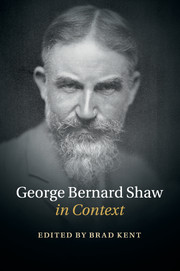Book contents
- Frontmatter
- Dedication
- Contents
- List of illustrations
- Notes on contributors
- Preface
- Acknowledgements
- A Chronology of Shaw's Works
- List of abbreviations
- PART I PEOPLE AND PLACES
- 1 Dublin
- 2 The Fabian Society
- 3 Germany and Austria
- 4 London
- 5 Oscar Wilde
- 6 W. B. Yeats
- PART II THEATRE
- PART III WRITING AND THE ARTS
- PART IV POLITICS
- PART V CULTURE AND SOCIETY
- PART VI RECEPTION AND AFTERLIFE
- Further reading
- Index
- References
4 - London
from PART I - PEOPLE AND PLACES
Published online by Cambridge University Press: 05 October 2015
- Frontmatter
- Dedication
- Contents
- List of illustrations
- Notes on contributors
- Preface
- Acknowledgements
- A Chronology of Shaw's Works
- List of abbreviations
- PART I PEOPLE AND PLACES
- 1 Dublin
- 2 The Fabian Society
- 3 Germany and Austria
- 4 London
- 5 Oscar Wilde
- 6 W. B. Yeats
- PART II THEATRE
- PART III WRITING AND THE ARTS
- PART IV POLITICS
- PART V CULTURE AND SOCIETY
- PART VI RECEPTION AND AFTERLIFE
- Further reading
- Index
- References
Summary
Bernard Shaw arrived at Euston, London's first inter-city railway station, on April Fool's Day in 1876, at the age of nineteen, having turned his back on his birthplace, Dublin. While Shaw was immensely proud to be an Irishman, he nonetheless cultivated a lifelong aversion for Dublin, dismissing it in the Preface to Immaturity as a place ‘of failure, of poverty, and of ostracism’. Adamant to the end, he declared a year before his death: ‘the house where I spent my not at all happy childhood has just been decorated with a tablet commemorating my birth there. I would see it blown to smithereens without the faintest regret, in fact, with exultation’ (CL IV: 857–8). With the exception of his extensive world travels, which began following his marriage to Charlotte Payne Townshend in 1898, Shaw spent the remainder of his life dividing his time between London, a vast and sprawling city he knew intimately and that figures as the setting in many of his plays, and his English country residence in the village of Ayot St Lawrence, Hertfordshire.
Beginning in the Reading Room of the British Museum, where he encountered the writings of Karl Marx, the iconoclastic Anglo-Irish polemicist came of age intellectually in the closing phase of the Victorian age, by which time London was already well established as the most important unit in the world economy. The capital of empire and the centre of international trade, London was for many Victorians an exhilarating place of consumption and consumerism. As the Irish-American critic Frank Harris declared: ‘London: who would give even an idea of its varied delights: London, the center of civilization, the queen city of the world without a peer in the multitude of its attractions, as superior to Paris as Paris is to New York’. Though Britain was at the summit of her imperial power, with many basking in what they believed to be a deserved state of serenity and security borne of strenuous social enterprise and moral earnestness, much of the capital's population existed on the edge of destitution. In the fullest sense, Shaw's plays, which speak to the complex and equally troubling economic and social realities of the times, offered audiences a radically ‘new’ understanding of a city many Londoners believed they ‘knew’.
- Type
- Chapter
- Information
- George Bernard Shaw in Context , pp. 29 - 35Publisher: Cambridge University PressPrint publication year: 2015



